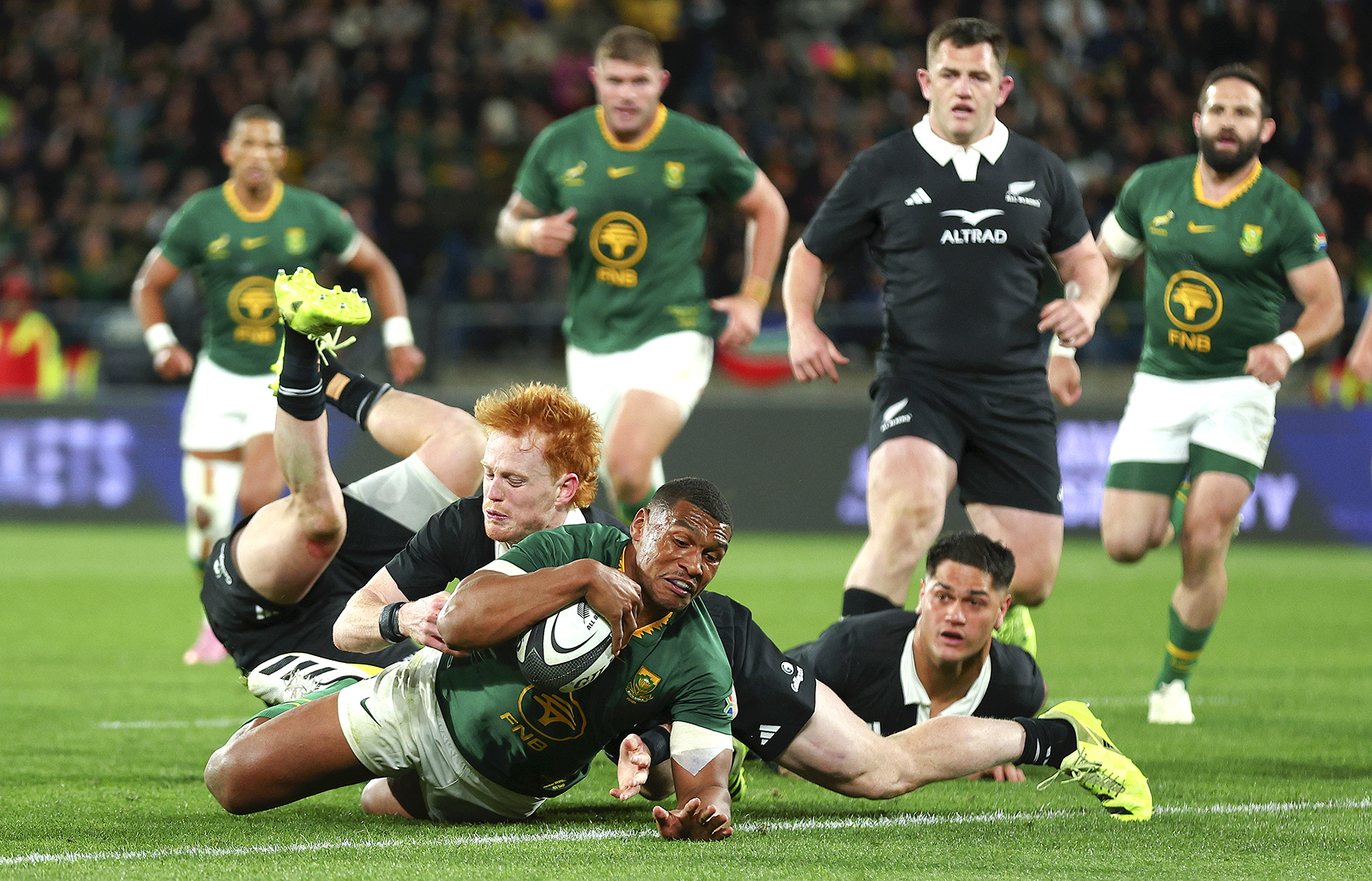For the past 11 months, an organisation calling itself Rugby Reinvented, or R360, has been drip-feeding vague details of a breakaway league promising huge salaries to players, to selected UK media outlets.
In broad terms R360’s stated objective, according to its prospectus, is: “A revolutionary Grand Prix-style global franchise rugby competition, aiming to feature the world’s best male and female players across 16 rounds in iconic international stadiums.”
Unsourced reports published in the past few months have even linked several unnamed Springbok players to the breakaway league.
How R360 will be funded, who will coach and play, where the teams will be located and how it fits into a greater global rugby picture, are all issues that are less clear.
Former England World Cup winner Mike Tindall is named as one of R360’s executive team. The other driving force is former Bath director of rugby Stuart Hooper, and John Loffhagen, the lawyer who played a key role in the launch of LIV Golf.
After months of seeing these vague details published in selected media outlets, the national unions of New Zealand, Australia, South Africa, Ireland, England, Scotland, France and Italy issued an unprecedented joint statement this week.
In it they cautioned players against falling for promises of a 16-game season while still being eligible for their national teams.
/file/dailymaverick/wp-content/uploads/2025/10/2237865237.jpg)
/file/dailymaverick/wp-content/uploads/2025/10/2198908767.jpg)
“As a group of national rugby unions, we are urging extreme caution for players and support staff considering joining the proposed R360 competition,” the statement read. “Each of the national unions will therefore be advising men’s and women’s players that participation in R360 would make them ineligible for international selection.”
The statement is clear. Any player or coach taking up a R360 offer won’t play Test rugby.
The International Rugby Players Association (Irpa) has also rejected R360.
“In recent months, various information has been in the public domain about the proposed R360 competition, and we understand that more recently a proposed draft long-form player contract may have been circulated by R360 to players and/or player agents,” Irpa said in a statement on 3 October.
/file/dailymaverick/wp-content/uploads/2025/10/2235161929.jpg)
/file/dailymaverick/wp-content/uploads/2025/10/2235285521.jpg)
“While Irpa and Irpa members have had some discussions with R360 representatives, these conversations have been focused on fact finding to understand the substantive detail about the business model, the competition, its delivery and its interplay with the existing ecosystem.
“Detailed information about the competition remains outstanding, and the competition does not currently have World Rugby regulatory approval.
“Irpa wishes to confirm that the competition and any associated player contracts are not endorsed by Irpa or Irpa members, and references to Irpa within any contract do not have Irpa permission.”
Heavy handed?
Some might say this is a heavy-handed approach by unions who are afraid of innovation. It’s possible that R360 has a masterplan that will shake up the sport.
R360, through its leaked reports, has indicated that the top 40 players would be paid £1-million (R25-million) per year for a 16-game season. It intends to sign 300 players in total.
There are claims that many of rugby’s top players have signed letters of intent to join R360 but, as yet, no names have been made public.
“We all welcome new investment and innovation in rugby; and support ideas that can help the game evolve and reach new audiences,” the joint statement from the unions said. “Any new competition must strengthen the sport as a whole, not fragment or weaken it.
“Among our roles as national unions, we must take a wider view on new propositions and assess their impact on a range of areas, including whether they add to rugby’s global ecosystem, for which we are all responsible, or whether they are a net negative to the game.
/file/dailymaverick/wp-content/uploads/2025/10/GettyImages-486504264.jpg)
/file/dailymaverick/wp-content/uploads/2025/10/2235285503.jpg)
“R360 has given us no indication as to how it plans to manage player welfare; how players would fulfil their aspirations of representing their countries, and how the competition would coexist with the international and domestic calendars so painstakingly negotiated in recent years for both our men’s and women’s games.
“The R360 model, as outlined publicly, rather appears designed to generate profits and return them to a very small elite, potentially hollowing out the investment that national unions and existing leagues make in community rugby, player development, and participation pathways.
“International rugby and our major competitions remain the financial and cultural engine that sustains every level of the game — from grassroots participation to elite performance. Undermining that ecosystem could be enormously harmful to the health of our sport.
“These are all issues that would have been much better discussed collaboratively, but those behind the proposed competition have not engaged with or met all unions to explain and better understand their business and operating model.”
Undervalued
R360’s proposal is heavy on criticism of the current structure of rugby, while offering few concrete details of how it will offer a meaningful alternative.
R360 claims that the sport of rugby, despite its global reach, is currently at a critical juncture, facing what the proposal describes as “seismic and generational change”.
R360 acknowledges that the sport boasts a significant global footprint with 800 million self-declared fans, and the Rugby World Cup ranks as the third most attended global sports event.
However, the professional game, since its inception in 1995, has been commercially hampered by “fragmented and disjointed league systems” and administrative decisions that are remnants of the amateur era, according to R360.
Financial challenges are severe and widespread across the sport. The global rugby market is estimated to be valued at a modest $3-billion, suffering from “poor executive teams in a fragmented ecosystem leading to massive under commercialisation” and “unspectacular growth of approximately 10% per year”.
The pessimistic view is that the current global rugby ecosystem is facing a multifaceted crisis of financial instability, significant player welfare issues, and outdated governance models. R360 has attempted to position itself as a saviour for rugby.
World Rugby approval?
R360 has not gained approval from World Rugby, and given the statement of the game’s leading unions it’s unlikely to receive enough support to become a sanctioned alternative.
According to R360 it has submitted more than 120 pages of documentation to World Rugby outlining detailed plans developed by world-leading experts on a range of areas, from competition regulations to player welfare measures to anti-doping policy.
At this stage, if R360 is to exist at all, it will have to do it as a disruptor “rebel” league.
R360 aims to launch in mid-2026, although the threat to players being banned from Test rugby is a severe blow to the new league’s plans.
“So many players love what R360 can do for them and the game, and we can’t wait to kick off next year,” R360 said in a statement issued on 7 October.
“Player welfare is one of the key reasons for creating our global series, which will greatly reduce player load and capture the attention of a new generation of fans globally.
“We want to work collaboratively as part of the global rugby calendar.
The series is designed with bespoke schedules for men’s and women’s teams, and R360 will release all players for international matches, as written into their contracts.
“Our philosophy is clear — if players want to play for their country, they should have that opportunity. Why would the unions stand in their way?
“We look forward to submitting to the World Rugby Council for sanctioning next summer as planned.” DM





 Damian Willemse of South Africa scores a try during their Rugby Championship match against New Zealand at Sky Stadium on 13 September 2025 in Wellington, New Zealand. Unsourced reports have linked several unnamed Springbok players to the breakaway R360 league. (Photo: Hagen Hopkins / Getty Images)
Damian Willemse of South Africa scores a try during their Rugby Championship match against New Zealand at Sky Stadium on 13 September 2025 in Wellington, New Zealand. Unsourced reports have linked several unnamed Springbok players to the breakaway R360 league. (Photo: Hagen Hopkins / Getty Images)